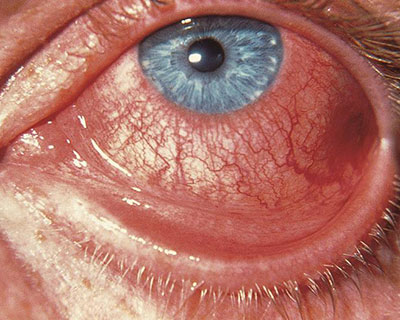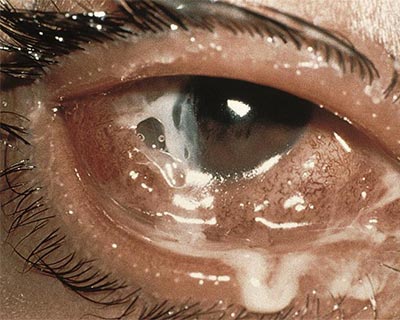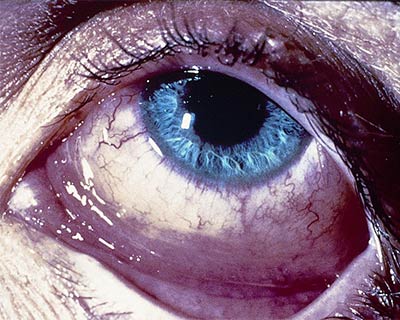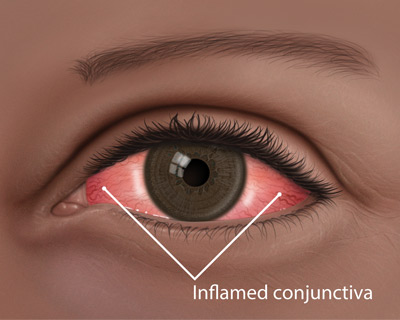Conjunctivitis—often called “pink eye”—is inflammation of the conjunctiva from infection or allergies. Your eyes are red and swollen (inflamed), and sometimes they have a sticky discharge. You can have conjunctivitis in one or both eyes. Some types of pink eye are very contagious (easily spread from person to person), but many others are not.
What Are the Main Causes of Conjunctivitis?
Conjunctivitis can be caused by a virus, bacteria or by allergies. Bacterial and viral conjunctivitis are easily spread from person to person. Allergic conjunctivitis is not contagious.
Viral conjunctivitis

Viral conjunctivitis is the most common type of conjunctivitis. This type of pink eye is very contagious and often spreads through schools and other crowded places. It usually causes burning, red eyes with a watery discharge. Viral conjunctivitis is usually caused by the same virus that causes runny nose and sore throat in people with the common cold.
Bacterial conjunctivitis

Bacterial conjunctivitis is also very contagious. An infection from bacteria causes this form of pink eye. With bacterial conjunctivitis, you have sore, red eyes with a lot of sticky pus in the eye. Some bacterial infections, however, may cause little or no discharge. Sometimes the bacteria that cause pink eye are the same that cause strep throat.
Allergic conjunctivitis

Allergic conjunctivitis is a type of pink eye that comes from an allergic reaction to pollen, animals, cigarette smoke, pool chlorine, car fumes or something else in the environment. It is not contagious. Allergic pink eye makes your eyes very itchy, red and watery, and the eyelids may get puffy.
How Do You Get Conjunctivitis?
Bacterial and viral conjunctivitis can be quite contagious. The most common ways to get the contagious form of pink eye include:
- Direct contact with an infected person's bodily fluids, usually through hand-to-eye contact.
- Spread of the infection from bacteria living in the person's own nose and sinuses.
- Not cleaning contact lenses properly. Using poorly fitting contact lenses or decorative contacts are risks as well.
Children are the people most likely to get pink eye from bacteria or viruses. This is because they are in close contact with so many others in school or day care centers. Also, they don't practice good hygiene.
How Do I Know If I'm Getting Pink Eye?

Your pink eye symptoms may include:
What Is the Best Treatment for Conjunctivitis?
Treating your pink eye usually depends on the type of conjunctivitis you have.
- There is no specific treatment for conjunctivitis caused by most viruses. Your body fights the virus on its own. Placing a cool, wet washcloth on your eyes can help make them feel more comfortable.
- If your pink eye is caused by a bacterial infection, your ophthalmologist may prescribe antibiotic eye drops, depending on how severe your symptoms are. Antibiotics do not treat an infection caused by a virus or by allergy.
- If your conjunctivitis is due to allergies, you might be told to use certain eye drops to help with the itchiness and puffiness.
- Sometimes conjunctivitis can be caused by a chemical or other substance in your eye. In this case, rinse the eye free of the substance. You might be told to use certain eye drops or ointment for the eyes.
Conjunctivitis usually goes away on its own within 1–2 weeks. If your symptoms last longer than that, you should see your ophthalmologist. He or she can make sure you don't have a more serious eye problem.
How Do You Stop Conjunctivitis from Spreading?
Viral and bacterial conjunctivitis can spread from person to person. Follow these tips so you will not infect other people or re-infect yourself.
- Use a clean towel or tissue each time you wipe your face and eyes.
- Wash your hands very often. Always wash them before and after you eat, when you go to the bathroom, or after you sneeze or cough.
- Try not to touch your eyes. If you do, wash your hands right away.
- Bacteria can live in makeup, and this can cause pink eye and even a dangerous infection of the cornea. Do not use eye makeup while your eyes are infected. Replace your makeup if you have an eye infection. And never share eye makeup with others.
- Make sure to clean or replace your contact lenses exactly as your ophthalmologist recommends. You should not wear contact lenses until the conjunctivitis goes away.